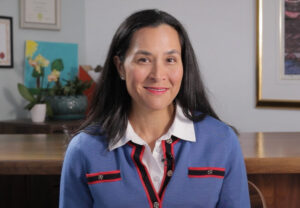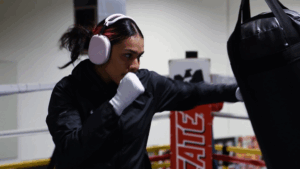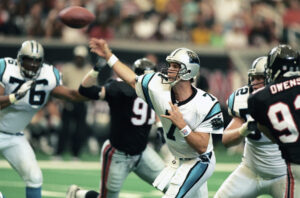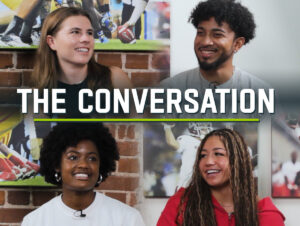How do you handle getting benched? Are you able to forgive (yourself and/or others)? How do you stay grateful? GameChange gathered a group of college athletes for a YouTube show called The Conversation, where the free-ranging conversation covered those topics and more.
Sidelined
“So, I lost my starting spot and my coach was trying to pick me up, and I just vividly remember crying after one of the trainings.” Former USC and current Orlando Pride soccer player Simone Jackson discussed how an injury caused her to lose her starting spot at the U-20 World Cup.
She hurt her hamstring in a friendly match against Spain ahead of the World Cup. The injury threw into doubt her ability to participate in the World Cup. Jackson was able to heal enough to make it to the World Cup squad, but the injury caused her to lose her starting spot.
An injury also sidelined USC basketball player Talia von Oelhoffen, which caused her to miss the last few weeks of her sophomore season. Interestingly, von Oelhoffen says that the injury caused her to change her entire perspective on sports and her personal identity. “That was just the first time I didn’t look at myself as just a basketball player. Up until that point. That was my entire identity. And then once that was taken away from me, stepping back and being like, if I never play basketball again, I’m still Talia,” stated von Oelhoffen.
Gratitude
When one thinks of training methods to become an elite athlete, developing a sense of gratitude is not something most people might consider to be essential. But USC professor Dr. Glenn Fox, a neuroscientist who studies and teaches high performance (including a class for GameChange), has explained that it is so important that elite units, such as Olympic teams and Navy Seals, make gratitude part of their training routine.
Gratitude is exactly what Jackson turned to after her hamstring injury landed her on the bench during the U20 World Cup. She explained the process: “After I was done throwing my own pity party, I was like, ‘You know what? I’m at the World Cup. I’m in Costa Rica.” Appreciation for getting the opportunity to be at the World Cup changed Jackson’s perspective from feeling sorry for herself to her saying, “Let me find a way to add value to my team even if it’s on the bench and for however long I get in, whether it’s 20 minutes or whether it’s 60 minutes, how can I contribute?”
With this new attitude, Jackson came off the bench against Japan to score the United States’ only goal of the game.
Forgiveness
Things can get heated during tight games, and sometimes words are spoken that might require forgiveness. UCLA women’s rugby player Madison Purves explained the dynamic of communication during a game. “With how fast-paced rugby is…everyone’s yelling at everyone all game, and then after the game you’re like, ‘Hey, sorry about that.’” It’s equally important to ask for forgiveness and to provide it when things are said that might have crossed a line. Teams with good chemistry don’t bury their issues; they are mature enough to keep the lines of communication open.
Although we want to hold each other accountable for mistakes that we make, the ability to forgive and learn from them is much healthier than just pointing fingers at teammates who messed up. And we all mess up. Long Beach State volleyball player DiAeris McRaven explained, “I’ve made plenty of mistakes, and the same mistakes I made, my teammates have made.”







